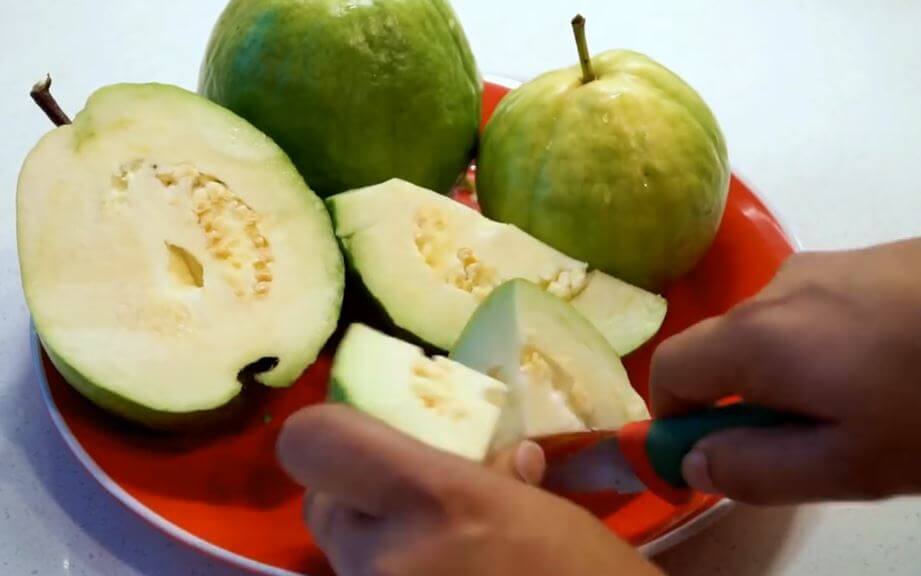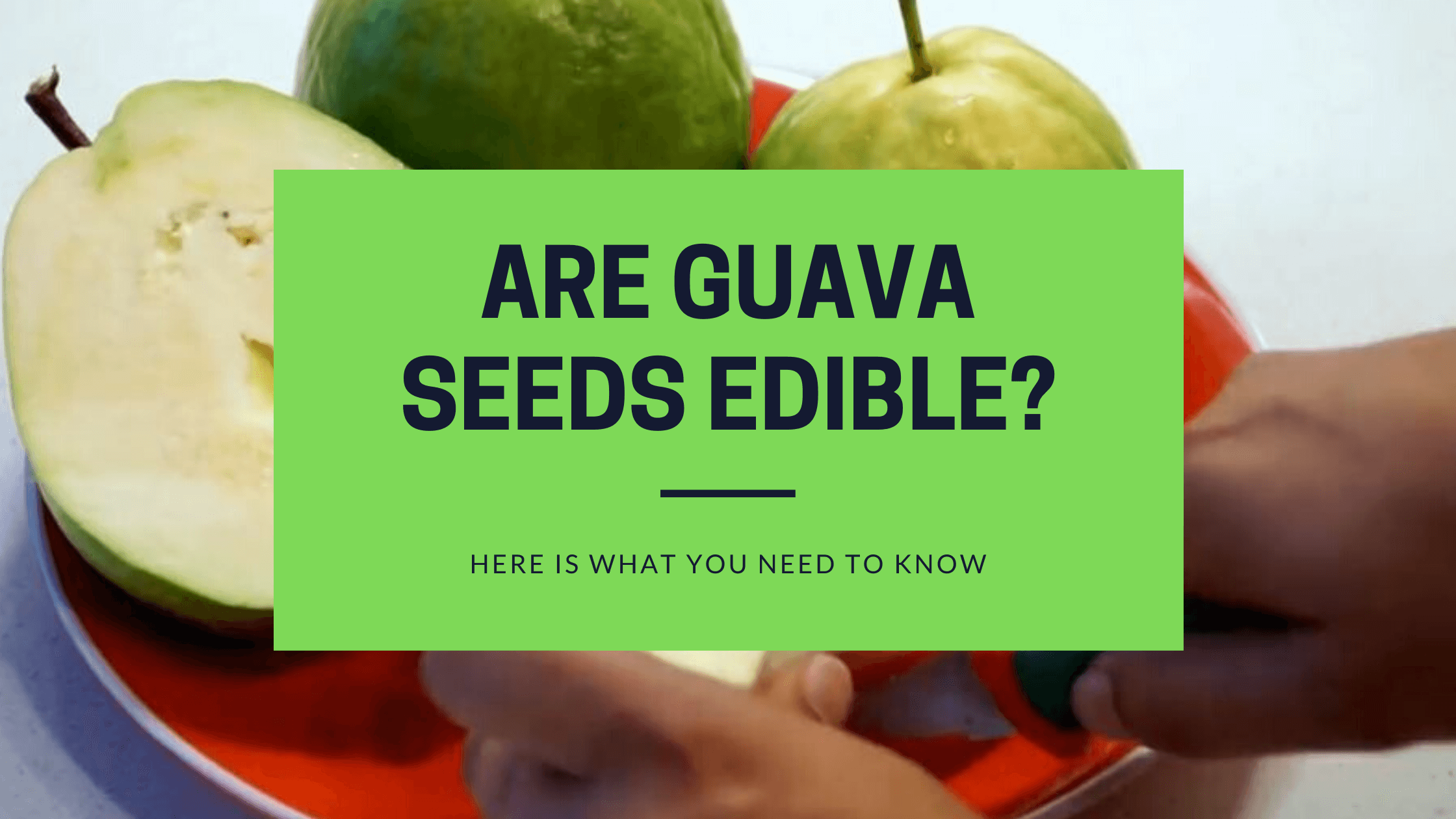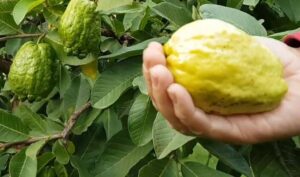Guava seeds were shown to contain numerous minerals, carbohydrates, and other phytochemicals, which are proved to help improve many health issues. But, are guava seeds edible?
Read on to find out.
Overview
Seeds are the fertile embryo of any fruit. They are the modified form of ovules. They are viable and can grow into a new plant whenever there are favorable climatic conditions.
Fruit seeds are usually removed and discarded as a waste product during or processing. In recent years, many researchers have given their precious time in an effort to find the food and nutritional values of different varieties of fruit seeds.
Guava fruit seeds are among the most nutritious fruit seeds and contain large amounts of soluble fibers, protein, and essential oil.
One 2000 study showed that guava fruit seeds contain about 6-12% of the total weight of the whole guava fruit.
Moreover, another 1994 study also showed that the fruit seeds of guava contained about 16% oil, 7.6% protein, and 61.4% crude fiber.
Additionally, one 2011 study also reported that the essential oil extracted from guava fruit seeds contains phytochemical compounds with strong anticancer, antimicrobial, and antioxidants properties.
Guava fruit seeds contain less trans and saturated fatty acids. The analysis showed that the total saturated and unsaturated fatty acids in guava seeds oil were 11.8% and 87.3% respectively.
The main fatty acids that are present in guava fruit seeds are linoleic acid (76.4%), oleic acid (10.8%), palmitic acid (6.6%), and stearic acid (4.6%).
Moreover, using a refractive index of 1.4772 at 40, guava fruit seeds oil was also shown to contain a high iodine value close to 134g I2/100g oil.
Moreover, another 2013 report also reported that the guava fruit seeds contained 618mg/g dry weight total dietary fiber.
What is more?
Here are some ways guava seeds can benefits your health:

Benefit #1: Help Control Cholesterol Levels
Guava fruit seeds contain less amount of trans and saturated fatty acids. And this is good for the body because taking guava seeds may not have a significant effect on the levels of cholesterol in the bloodstream.
Moreover, the phenolic compounds present in guava seeds are antioxidants in nature. These antioxidants were shown to cut down the levels of free cholesterol in the body.
Benefit #2: Help Control Blood Pressure
Guava seeds may also help lower high blood pressure. Guava fruit seeds contain potassium, vitamin C, terpenoids, and quercetin flavonoids. And these nutrients are useful for preventing and reducing high blood pressure.
Benefit #3: Help Improve Heart Functions
Guava fruit seeds help decrease the levels of free cholesterol in the bloodstream. It was also shown to control blood pressure. And all these help improve heart functions.
Benefit #4: Can Help Improve Eyesight
Guava fruit seeds were also found to contain vitamin C and A. And these vitamins are important for eyesight. They improve eyesight.
Benefit #5: Help Control Cancers
Guava fruit seeds contain lycopene and other antioxidants such as flavonoids and terpenoids. And these antioxidants are found to involve in controlling and preventing the growth of cancer cells such as prostate cancer and skin cancer.
Benefit #5: Guava Seeds Can be Used as Dietary Laxative
Guava fruit seeds contain high amount of fiber which is useful for proper digestion aand control of consticipation. Guava seeds can also help relieve stomach pain and other stomach problems.
Benefit #6: Help Improve Bowel Movement
Guava seeds were also shown to improve bowel passage. This may be due to the high dietary fibers content that is present in guava fruit seeds.
Benefit #7: Help Improve Gut Bacteria
Guava seeds were also found to improve gut bacteria. These are useful bacteria that aid digestion. And taking a healthy amount of guava seeds alongside guava pulp was found to increase the functions of this intestinal microflora.
Benefit #8: May Help Improve Respiratory Pathway
Seeds of guava fruit contain tannins, quercetins, flavonoids, vitamin c, and lycopene. These are important nutrients for controlling and reducing respiratory problems.
Guava Seeds Side Effects

Despite all these benefits we have discussed above, if you over-consume guava fruit seeds, you may experience so many side effects. This is because guava fruit seeds are loaded with a high amount of fiber.
Moreover, if you do not chew the seeds properly before swallowing or grind them into powder, you may also experience other serious side effects.
These side effects that may result from consuming guava fruit seeds in a wrong way include:
Risk of Appendicitis
Eating guava seeds without properly chewing may accumulate in the diverticulum and help cause diverticulitis or appendicitis. This is especially more common if you are swallowing seeds of some guava varieties that have large and strong seeds. However, this side effect of guava seeds is uncommon.
May Cause Constipation
The high amount of fibers that are present in guava seeds are important for the management of constipation. However, when taken in excess may also help cause constipation and bloating.
May Help Cause Weight Gain
Guava seeds were shown to be loaded with protein, carbohydrate, and oil. Despite these nutrients are found to be within the healthy limit but taking too much of guava fruit seeds may also increase weight gain.
Risk of Allergy
Some people were found to be allergic to guava seeds. However, this is very uncommon and only occurs among a few people.
Risk Cyanide Poisoning
The level of cyanide in guava fruit seeds is very small. However, too much consumption of guava fruit seeds may help this cyanide to accumulate in large quantities in the body. And this can be excreted alongside feces, which may cause cyanide poising in the environment. However, this is very rare and there is a need for a complete study to prove that.
Does Guava Seeds Cause Kidney Stones
Guava seeds may not cause kidney stones. This is because guava fruit seeds do not contain compounds that undergo precipitation. Moreover, digestion and metabolism take place in the stomach and intestine.
Therefore, it is very unlikely that guava fruit seeds can cause kidney stones. However, we cannot conclude that it is not possible but thorough research is needed to confirm that.
Guava without Seeds
If you feel like you cannot take guava seeds due to their hardness or you are allergic to the seeds, you always have the option to go for seedless guava.
There are different varieties of guava that contain seeds. So, you can only enjoy the juicy flesh.
How to remove Guava Fruit Seeds
And if you also cannot find the seedless guava fruit, you can manually remove the seeds and only enjoy the flesh of guava fruit. Learn how to remove guava fruit seeds efficiently and without mess up.
Takeaway
Guava fruit seeds are basically considered safe. But, you need to consume guava seeds in small quantities and preferably well chewed before swallowing.
Conclusion
In this guide, we looked at the safety of eating guava seeds and how you can enjoy them. We also went ahead to discuss the side effects of eating too much guava fruit seeds.
We hope that you found this article useful in understanding the safety of guava seeds. We would love to hear from you about this guide. So, do not forget to let us know your questions and views in the comment section below.
Recommended reading:
>Minerals And Vitamins In Guava Fruits And Leaves
>List Of Antioxidants In Guava Leaves And Fruits
>When Is Guava Ripe?: Here Is What You Need To Know
>Are Guava Seeds Edible?: Find Out Here
References
Astro-vargas, H.I.; Restrepo-sanchez, L.P.; Parada-alfonso, F. Antioxidant activity from guava seeds (P. guajava) of white fruits, pink fruits, and red fruits from Colombia. In ISSF 2012, (p. 5). Retrieved from here
Nicanor, A.B.; Moreno, A.O.; Ayala, A.M.; Ortiz, G.D. Guava seed protein isolate: Functional and nutritional characterization. Journal of Food Biochemistry 2000, 91, 77–90.
Prasad, N.B.L.; Azeemoddin, G. Characteristics and composition of guava (Psidium guajava L.) seed and oil. Journal of the American Oil Chemists’ Society 1994, 71, 457–458.
Mohamed, G.F.; Mohamed, S.S.; Taha, F.S. Antioxidant, antimicrobial, and anticarcinogenic properties of Egyptian guava seed extracts. Journal of Nature and Science 2011, 9, 32–41.
A. R. Noor Raihana, J.M.N. Marikkar, I. Amin & M. Shuhaimi (2015) A Review on Food Values of Selected Tropical Fruits’ Seeds, International Journal of Food Properties, 18:11, 2380-2392,
Chang, Ying Ping & Tan, May & Lok, Wai & Pakianathan, Suganthi & Supramaniam, Yasoga. (2013). Making Use of Guava Seed (Psidium guajava L): The Effects of Pre-treatments on Its Chemical Composition. Qualitas Plantarum Plant Foods for Human Nutrition. 69.




